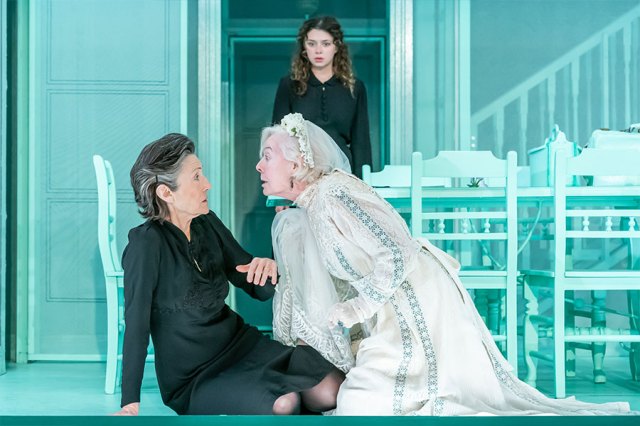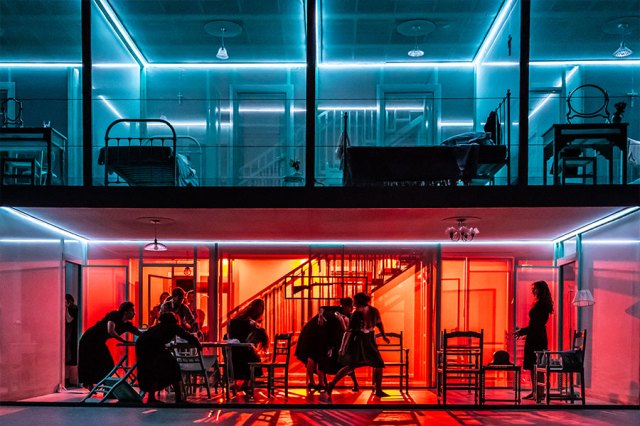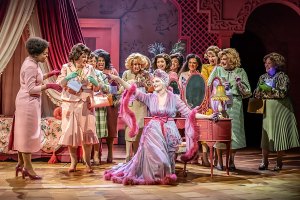The House of Bernarda Alba at the National Theatre – review
Rebecca Frecknall directs Alice Birch’s take on the tragedy, starring Harriet Walter

The stunning opening of Rebecca Frecknall’s new production of Federico García Lorca’s The House of Bernada Alba is based on a series of contrasts. The black of mourning versus the stark light of a home that looks like a convent; the movement of a muscled man versus the stillness of women; the bawdy talk of servants set against the stilted social chat of the respectable.
Designer Merle Hensel has filled the Lyttelton stage with the framework of a house, its fittings the same pale cyan as the light. Each of Bernarda Alba’s five daughters and her delirious mother has their own room in this prison-like place, pinioned by two gates on either side. As the action unfolds in the living room downstairs, they retreat to their rooms, each in their different ways trying to escape the oppressive atmosphere imposed by their tyrannical mother, letting the viewer into their world and into their despair.
As Bernarda Alba, Harriet Walter opens the action standing in front of the dolls house structure, watchful and wary, listening to the murmurs from within. She cuts an imposing figure, bolt upright, feet planted firmly on the ground. Her rule, her sequestration of her daughters from the world of passion and men, her relentless insistence on their obedience, is flecked by ripples of doubt and care. She thinks she is protecting them from the harsh patriarchal society outside, yet her rigour destroys them.
Lorca was murdered by Spanish Nationalists months after completing the play in 1936. That history, combined with his overt homosexuality in a society where it was forbidden, means the play is often seen as a critique of totalitarianism, a symbolic study of a society where passion and difference are banned in the name of religion and social conformity. But it is also something else and this version, credited to Alice Birch after Lorca, subtly alters the balance between its poetry and its realism, adding layers of psychological motivation – and a lot of swearing – to its portraits of the women.
She creates a hint that the oldest daughter Angustias (Rosalind Eleazar) has been abused by her step-father, and an act of searing violence from Bernarda Alba towards disabled Martirio (Lizzie Annis). As director, Frecknall introduces the character of Pepe El Romano, normally only spoken of, in the physical form of dancer James McHugh, an embodiment of the sexual longing that the women feel.
She also emphasises how starved they are of colour in their lives; Lee Curran’s lighting washes the stage in gold when McHugh appears and in rich, terrifying red when the youngest daughter Adela (Isis Hainsworth) consumed by her illicit feelings for Pepe (who is engaged to Angustias) imagines being killed by a mob for her behaviour.

The effects are stunning, managed with delicate precision, and emphasised by an exceptional soundscape from Peter Rice (full of the sounds of dogs barking, stallions kicking the stable doors) and music by Isobel Waller-Bridge that conjures a life elsewhere, in the rich singing of men going to the fields, or fragments of sound on the breeze that is never allowed to enter the stifling house.
The production doesn’t always quite hold the tension between naturalism and expressionism that it seeks, and there are some issues with the way that the dialogue tumbles from room to room, sometimes becoming stilted as it falls, yet it is absolutely on-the-edge-of-your-seat engrossing. It’s surprisingly funny at moments, always pointed and sharp, with the comments of the wise servants (brilliant Bryony Hanna and superb Thusitha Jayasundera) underlining the household’s folly and fears, bringing gossip and perspective.
Walter is superb, subtle and dangerous, plucking at the air with her hands as she repeats “this house”, trying to hold on to what she believes. But the strength of the whole lies in a magnificent ensemble cast, each bringing surprising notes to characters who could become one-dimensional.
As Adela, Hainsworth introduces a note of frailty to her hysteria, a sense that she is on the brink of becoming as senseless as her grandmother who, in Eileen Nicholas’s powerful incarnation, stalks the action with her dreams of marriage and freedom, her fears that Bernarda Alba is “pulverising” her daughters’ hearts. Eleazar is heartbreaking as the ageing Angustias, grasping at her last chance of happiness, while Annis makes Martirio a figure of tragic stature.
It’s a superb night of theatre, a new look at a difficult but always timely play.















